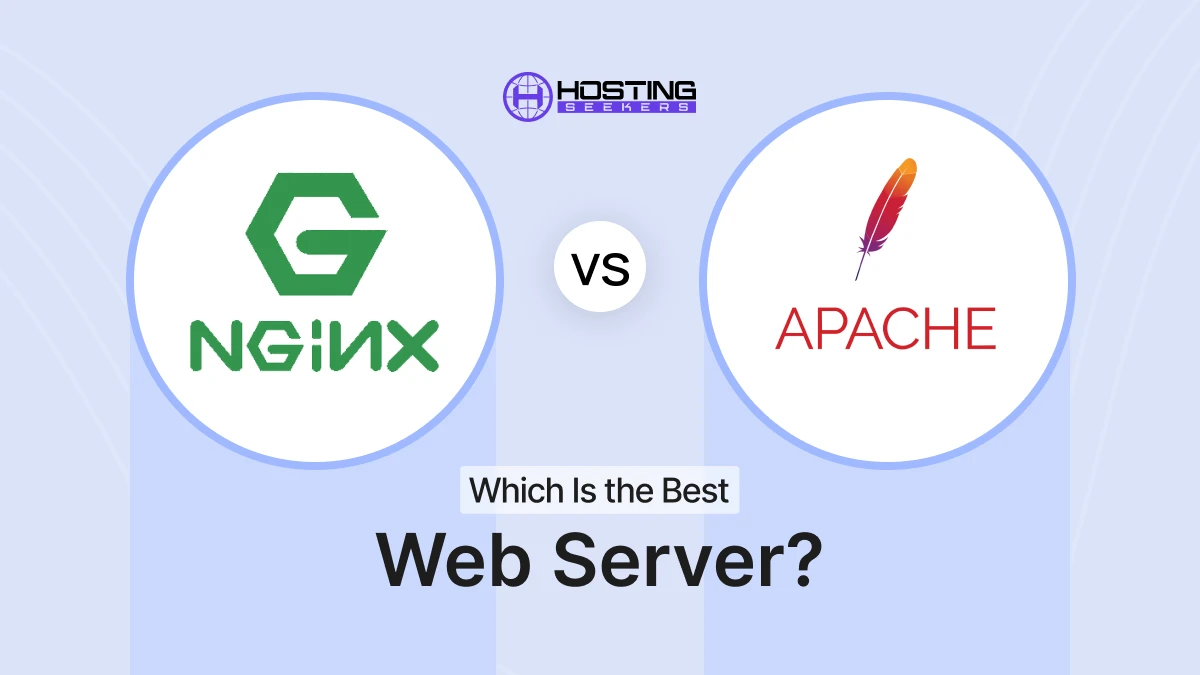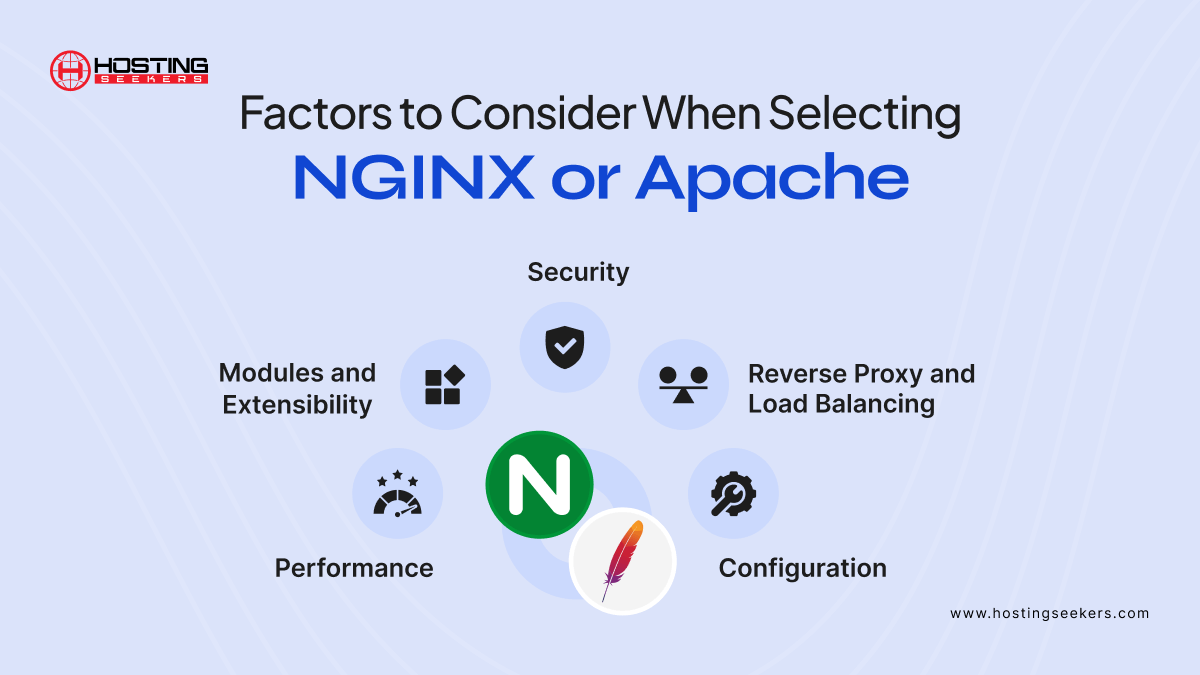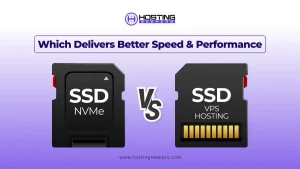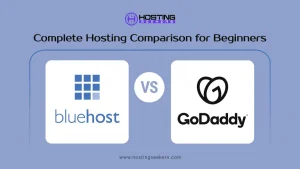
Nginx vs Apache: Which Is the Best Web Server in 2026?
Comparison Web Server Updated on : December 31, 2025A web server is a computer used to locate, store, operate as well as serve up webpages to end-users. Two major webservers dominating the internet today are Apache and NGINX. Therefore, more than half of all websites worldwide are hosted on these two web servers.
They are both designed and developed to handle different workloads and to complement different types of software, creating an extensive web application stack. Well, when selecting NGINX and Apache it’s important to understand this difference for making the right choice.
Table of Content
What is NGINX?
It was the year 2004 in which the first public announcement of NGINX was made by a Russian developer, Igor Sysoev. NGINX is an open-source software specially designed for web serving, caching, reverse proxying, media streaming among other uses. Its primary purpose at its inception was mainly serving static files but currently, NGINX is a full-featured web server meeting all server-related needs.
Benefits of NGINX Web Server
– NGINX is free open source
– NGINX comes with an easy configuration system, unlike Apache. The user must edit no more than two files.
– The performance of NGINX when it comes to serving static files like zip, pdf, HTML, mp4, MPEG, AVi-, jpg, gif, Png and others is commendable.
– NGINX can easily manage and handle traffic from any web app with less difficulties and offers configuration guides for most applications. Also, different apps like python, WordPress, ruby, Bulleting, Drupal, phpBB, and many other famous are served by NGINX.
-It allows to make websites faster by allowing them to get higher ranking by Google as they have already made various changes in the search ranking algorithm and recently, they made the speed of the website also a part of the algorithm.
What is Apache?
Apache is an open-source cross-platform web server that offers web content through the Internet. It was developed by Tim Berners Lee and released in 1995. Apache became popular early, and now it is maintained by the Apache software foundation. Just like all web servers, Apache hosts web content—such as PHP files, HTML pages, audio, and video- and serves the content to users when they visit a website.
Benefits of Apache Web Server
– Apache is an open source which makes it free to utilize and enables community developers to extend and modify it seamlessly.
– Apache is flexible due to its presence of dynamic modules.
– Also, Apache is compatible with Unix-like OS like BSD, Linux, MS windows, etc.
– Apache has optimal deliverability for static files and is compatible with any programming language.
NGINX and Apache: Comparison Table
Features |
Apache |
NGINX |
| Operating System Support | Apache runs on all Unix-Like systems like BSD Linux, etc. | NGINX also operates on UNIX-like but has restricted support for windows. |
| Simplicity | Apace is user friendly and also easy to design as it offers a one-connection-per process model. | NGINX is complicated to design and develop as it has a sophisticate architecture to easily manage and handle multiple connections. |
| Basic Architecture | Apache follows a multi-threated / process-driven approach to managing and handling client requests. | It follows a single-threaded approach to managing and handling customer request. |
| Static Content | Slower in highlighting Static content. | Its faster than Apache when comes to highlight static content |
| Traffic Handling | Apache cannot manage and handle multiple customer request with more web traffic | It can handle multiple client request with heavy traffic |
| Memory Consumption | The memory consumption is more. | It uses limited hardware resource to manage and handle to client request and consumer less memory. |
| Usage | It is designed and developed to be a web server. | It is designed and developed to be both a web server and a reverse proxy server. |
| Centralized Configuration | It allows extra configuration on a per-directory basis through .htaccess files. | It has a relatively simpler configuration system. Also it don’t enable additional configuration. |
| Security | It also offers good security and is considered less when compared to NGINX. The codebase of Apache is very high. | It provides better security with a smaller codebase. |
| Feature Modules | It consists of dynamically loadable modules that can be turned off/on. Loading and unloading of modules is simpler in Apache. | The core version of NGINX does not support dynamic modules but NGINX plus which is a paid version of NGINX support. |
| Support | It is managed and handled by a user community from across the world and coordinated by Apache software foundation. | It is handled by NGINX Inc company which was founded in 2011. Community support is done through Internet relay chats, stack overflow, and mailing lists. |
NGINX vs Apache: Key Differences
Let’s explore the comparison of Apache versus Nginx servers:
– NGINX is a fast web server and reversed proxy, while Apache is an HTTP server that is open-source. NGINX acts as a reversed proxy that sits behind the firewall in a private network so that it can direct all requests made by users to appropriate backend servers.
– Also, the fundamental difference between Apache and NGINX is in their architecture. NGINX has a single-threaded architecture where different client requests are managed and handled in a single thread. While Apache has a multi-threaded architecture where a single process is created for a request.
– When comparing NGINX over Apache, NGINX is well-equipped to manage and handle static content. It’s 2.5X quicker and faster than Apache. Moreover, when it comes to dynamic content, Apache processes dynamic content natively within the web server itself, whereas NGINX fails to process dynamic content as it depends on external processes.
– Speaking about Apache vs NGINX support, NGINX supports almost all Unix operating systems but has limited support for Windows while Apache totally supports Unix-like MS and OS windows.
Factors to Consider When Selecting NGINX or Apache

There are many things you need to take into account when choosing between Apache or NGINX for your web server. Here you can find a detailed comparison and make your decision:
1. Performance
Apache uses a process-based model where every request will spawn either a new process or a new thread, this can lead to increased memory overhead under load. One thread can handle several requests due to its event-driven design, which makes it more efficient with CPU and RAM usage.
2. Configuration
It is easier for most people to understand Apache’s settings because they resemble other servers’ practices. These changes are also very easy to effect without necessitating any shutdowns using .htaccess files designed inside directories.
Meanwhile, Configuration language is more straightforward and compact, although it demands that you reboot your server after every editing session. Consequently, there is no provision for .htaccess in Nginx; everything has to be controlled centrally.
3. Modules and Extensibility
Apache has rich module support that enables loading or unloading dynamically to ensure that it offers a wide range of options. Whereas Unlike Apache, however, NGINX is not modular in such way – its modules must be built right into the kernel, reducing dynamism.
4. Reverse Proxy and Load Balancing
Although Apache is good at reverse proxying and load balancing, it is not as efficient or feature rich as NGINX. On the other hand, NGINX was created with reverse proxying and load balancing mechanisms as its main functions, therefore providing higher performance and many more features for performing these tasks.
5. Security
Apache continuously receives updates to ensure its code is secure while at the same time providing various security configuration settings. On the other hand, NGINX also receives frequent updates which are intended for enhancing its security by default hence many people find it relatively safer because of its clear and advanced codebase.
Final Verdict
Each web server has its own strength and can be selected depending on your particular needs. Select Apache If you need easier dynamic content handling with built-in scripting language support and easy configuration. Select NGINX if you need enhance performance with static content services. Therefore, the choice between both Apache web server vs Nginx depends on your business requirements.
Frequently Asked Questions
Q 1. What is the difference between Apache Web server and NGINX?
Ans: Apache server offers dynamic and static content whereas NGINX cannot process dynamic content internally.
Q 2. What is NGINX server used for?
Ans: NGINX is used for load balancing, reverse proxy, and caching.
Q 3. What is Apache used for?
Ans: Apache is responsible for granting Internet users directory (HTTP) queries and offering them the web pages and files they seek.
Q 4. Why use NGINX and Apache together?
Ans: With the combination of NGINX and Apache, the website’s maximum number of concurrent connections rises. The amount of CPU and memory resources used by the server drops.
Q 5. Does Google use Nginx or Apache?
Ans: Google utilizes Google Web Servers (GWS), which are Linux-based servers. Therefore, Google utilizes custom Linux-based services for all its online services.




